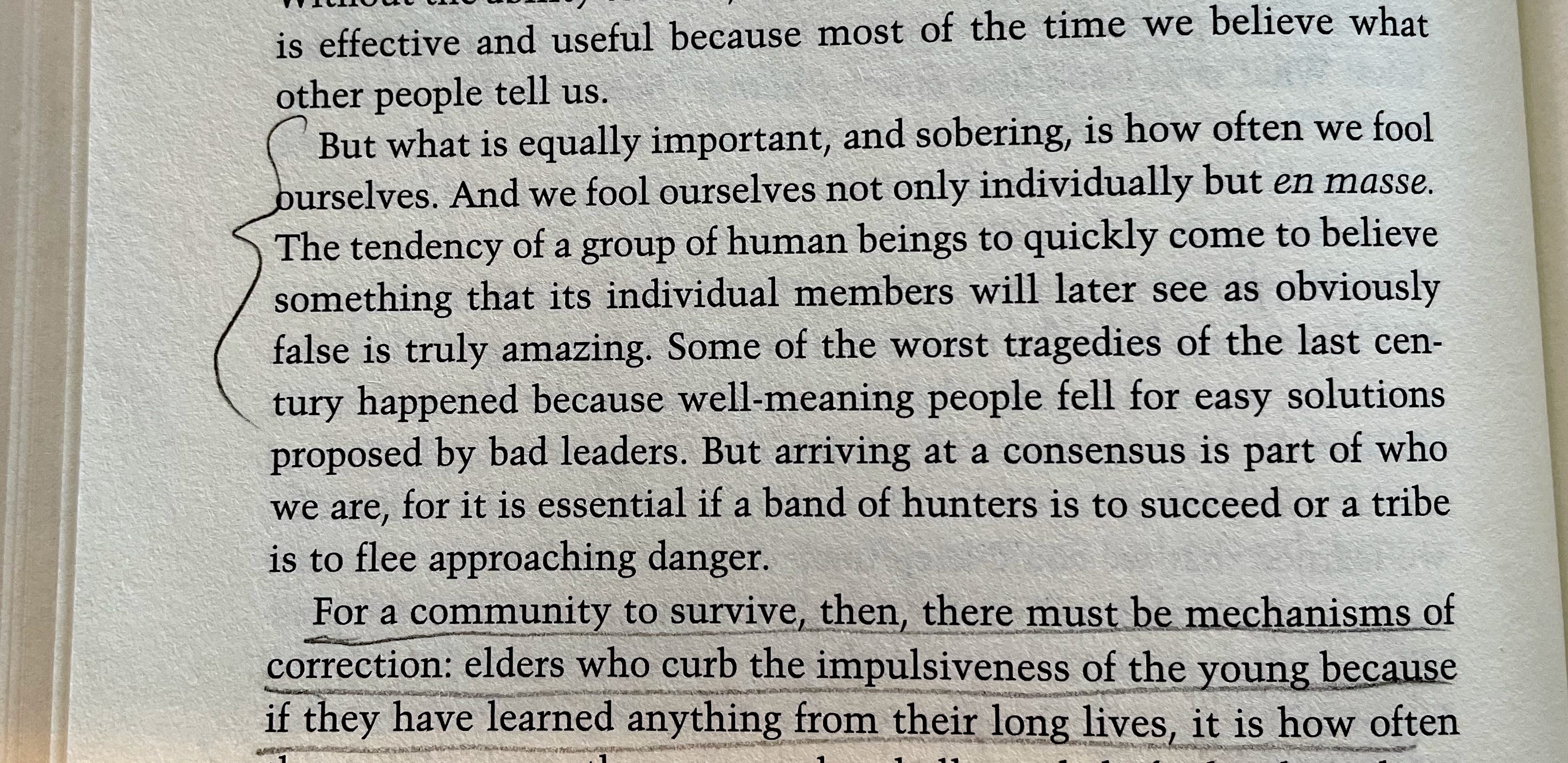
Dear Friend and Reader:
You may be noticing that society and many people seem to be going insane. While the world has never been an especially rational place, we are watching it go over the top day by day and year by year.
Is anyone paying attention? How many times in recent years have you wondered what happened to common sense?
Have you ever thought about what “common sense” really is? It’s one of those things we all think we understand and yet are unlikely to have looked up or evaluated. And once you have a clue what the term describes, it’s easy to see where it’s gone and why it’s so crucial that we pay attention to this problem.
A standard definition of common sense is “ordinary understanding, without which one is foolish or insane.” This implies: you don’t need an expert opinion; anyone can grasp this. Later it came to mean “good sense,” with a slightly different shade of meaning. Both imply doing what “makes sense” or is “sensible” — and that is the operative concept: sensory perception.
In this essay, I will propose what I think has happened to common sense, and how understanding Venus retrograde may provide a response. If you are concerned about your sense of disorientation, depression or despondency, read on.

A Revolutionary Principle
The notion of common sense means different things to different people, but is somehow not void of vagueness. We might assume that the people who don’t understand the concept don’t have any of the stuff. Yet the concept is rarely discussed; for a real conversation, I had to seek the input of people more scholarly than myself.
You may know that Common Sense was the title of a book by Thomas Paine, poet and friend of Ben Franklin, first published in early 1776. This was a tract encouraging independence of the colonies from England. History records this as one of the earliest serious intellectual presentations on the topic. Paine was saying that this is so simple, anyone should be able to understand it.
Here is a sample quotation:
“Until an independence is declared, the continent [meaning the colonies] will feel itself like a man who continues putting off some unpleasant business from day to day, yet knows it must be done, hates to set about it, wishes it over, and is continually haunted with the thoughts of its necessity.”
You could apply this idea to many facets of life as we currently know it. We are haunted by a sense of urgent necessity, delayed day by day, as many people are paralyzed to do much about what they feel. We’re too busy being told what to think and what to do.
In order to be committed to something, you must perceive it with your senses, and think the matter through until you understand it in a meaningful way. This ability to “think things through” is often the dividing line between true confidence and false confidence (or none at all). People who actually think know they have an advantage over those who pretend or delegate to authority.

The Sensus Communus
There is also a formal definition of common sense that is easier to grasp, and is much more useful. Common sense is a reasoned evaluation of what your external senses tell you — a “central cognitive function that integrates and monitors the delivery of the other distinct senses, as when a shape is both seen and felt.”
So that might mean looking at food and smelling it, and deciding whether you want to eat it. Then you might taste a little before taking a big bite, just to be sure.
Common sense is also a powerful interpersonal tool as well, offering caution when someone says something to you, but you don’t trust the expression on their face, even if the words sound good.
In Hakomi Therapy training, candidates are taught to observe facial expressions as the client speaks their words. If they are frowning when they say it’s their birthday, or smiling when talking about how sad they are that their cat died, you have something meaningful to work with. Your common sense spots the inner tension. But this requires paying attention.

Common sense is an internal ability that relies upon the outer senses. When Fritz Perls said, “Lose your mind and come to your senses,” he was saying pay attention to what your senses are telling you. Make your assessments based on that rather than on the scripts your mind may be running, or matters of opinion.
The outer senses as defined by Aristotle (382-324 BCE)— sight, touch, taste, smell and hearing — get the notoriety, and would all feed into common sense if we were paying attention to them. These five are the usual senses described to children in kindergarten or first grade, but nobody says you have a whole other set of senses. Marshall McLuhan, the founder of media studies, offered theories that described the impact of different media on the outer senses, and the disruption of the ratio of the senses.
Then there are the lesser known inner senses. Four of them were described by the medieval monk and scholar Thomas Aquinas (1225-1274): Common sense, imagination, cognitive ability, and memory. (I think there are others, including sense of humor.) These are affected by exposure to media just as much as the outer senses are. In fact, they have largely been taken over.
Remember this is true when you see someone unable to interact with the world in any way that does not involve their iPhone or other AI device.

One of the core concepts of media studies is understanding the impact of technology on sensory perception. In all cases, there will be some emphasis that throws things out of balance, and this can spread from individuals through communities to the whole society.
All technologies are extensions of the body and its nervous system. We now live on a planet where every thought and move we make is connected to a planetary information grid, and this is overwhelming. In fact it’s so overpowering that the tendency is to numb out — and that is the digital haze and stupor that we see everywhere.
Exposure to media (or any media environment) rearranges sensory perception. For example, as millions of people learned how to read phonetic alphabets, that pushed vision to an extreme and changed people and society in many ways.
It rearranged structures of the mind and created the extreme subject-object divide we live with today.
Print demanded extreme precision in visual language, thus the standardization of spelling, and differentiating languages in specific ways. This in turn led to differentiating concepts of country in a new way, creating a wave of nationalism that is finally starting to melt under the influence of digital conditions.
Electric light (the turning of night to day) emphasized vision at the expense of sound. Then radio came along and pushed hearing to an extreme. We take this as it comes, though we are at a significant loss for not understanding what these things do to us.

Invasion of Inner Territory and Capturing the Inner Senses
All electrical media invade and draw people out of their private inner space created by reading, and turn people into members of pseudo tribes, connected by a vast central nervous system.
This is the famous “global village” created by radio. There is much to say about how media affect the outer senses, but these days I’m concerned about the effects of the digital environment on memory, imagination, thinking and common sense. I am grateful to McLuhan scholar Mark Stahlman for pointing out this set of issues. You can see our interview here.
One easy example is how television externalized the imagination with brute force. Radio and reading depended entirely upon it. You cannot enjoy a book or radio drama without utilizing your imagination. Nobody needs to imagine much anymore because they have everything thrust upon them as external images.
More troubling is that memory has been externalized to digital devices — whether we’re talking about 10,000 photos on your phone, or no longer knowing a single telephone number. The entirety of life is now on speed dial.

The Cognitive Function is Overwhelmed
Sometimes I think my email is so complicated, thankfully I have the power of computers to help me keep track of it. But email would not exist without computers. And staring at 250,000 messages in my inboxes, I am often still left spinning.
The cognitive function — that is, the ability to think — has become so overwhelmed that there is no time to think (as Bob said) here in the valley of the missing link. And this is not just about time — it’s about ability and willingness.
We are losing any contact with our inner and outer senses, and that is more than adequate to describe the feeling of insanity we now live with as its presence creeps ups around us. If you think it’s crazy to text while you drive, or to stare at your phone while crossing 8th Ave. during rush hour traffic, you know what I am getting at.
As for sense of humor, the condition of the digital age is that everything has to be tagged, “This Is Supposed to Be Funny” (with an explanation provided), or they don’t get the joke. Of course, nothing in writing is funny if you don’t read it. Without the meekest hint of irony, someone in an astrology forum recently said there needs to be a “satire emoji.” This is a perfect example of externalizing the cognitive sense, and common sense, for those who are so blurred and blotted out that they don’t get a joke, or realize something is over-the-top ridiculous.

Venus Retrograde: Turning Inward
A Course in Miracles devotes a whole chapter to “The Fear to Look Within.” Digital conditions are a real boon for the ego, offering a world where many people think they need to do no such thing. The very notion of “within” or an “inner life” no longer seems to exist for many people. But most do not know it. They live in a convincing replica of their former self.
This is one reason why retrograde planets can be so challenging: they are all an invitation inward, and to review what has happened in the past (a memory and cognitive experience).
Venus is one of the most sensory planets. It’s associated with the signs Taurus, Libra and Pisces, all of which pertain directly to aesthetics. Taurus emphasizes the tactile sense and a value for quality, Libra adds a sense of design and balance, and Pisces adds subtle qualities of light, sound and “extra-sensory” ability to perceive.
Note that a big part of “extra sensory” involves the inner senses.
Venus also represents emotional intelligence, which you might describe as a hybrid of what you think and what you feel — a variation on “sensus communus.” Often, this feat of being emotionally intelligent is performed by tuning into what you see, hear and feel. Basic sensitivity begins with the senses.
Then it requires that we do something useful with the information. And if the emphasis of Venus retrograde is the inner life, and there is a vacant or hollow feeling in one’s interior psychic space, the effect can be nerve-racking.

Venus Retrograde and Memory
One last thought for today, in written form. I will have more in a series of paid readings available to my Substack subscribers and Backstage Pass holders.
Retrograde planets want us to recall something, usually something we’ve repressed. They are a difficult topic for astrology students, and most books are not helpful. But Martha Lang Wescott, my friend and sometimes personal advanced astrology tutor (asteroids, Uranian astrology, and many other skills) shared this idea with me.
In a natal chart, the retrograde represents an ability in the child that “threatened” the parents or caregivers. The child therefore turns it off, in a measure of self-preservation. But that leaves them with an undeveloped ability, or some form of repressed desire.
Now imagine that transiting retrogrades work in a similar way. They call us toward something forgotten, concealed or lost. They take us into a version of the elusive 12th house, where we may do some retrieval of an aspect of our soul.
Venus retrograde in Leo describes this as a thing of great value, worth its weight in gold. That quality, whatever it is, is within you, waiting for you to reach in and discover something about yourself.
With love,




